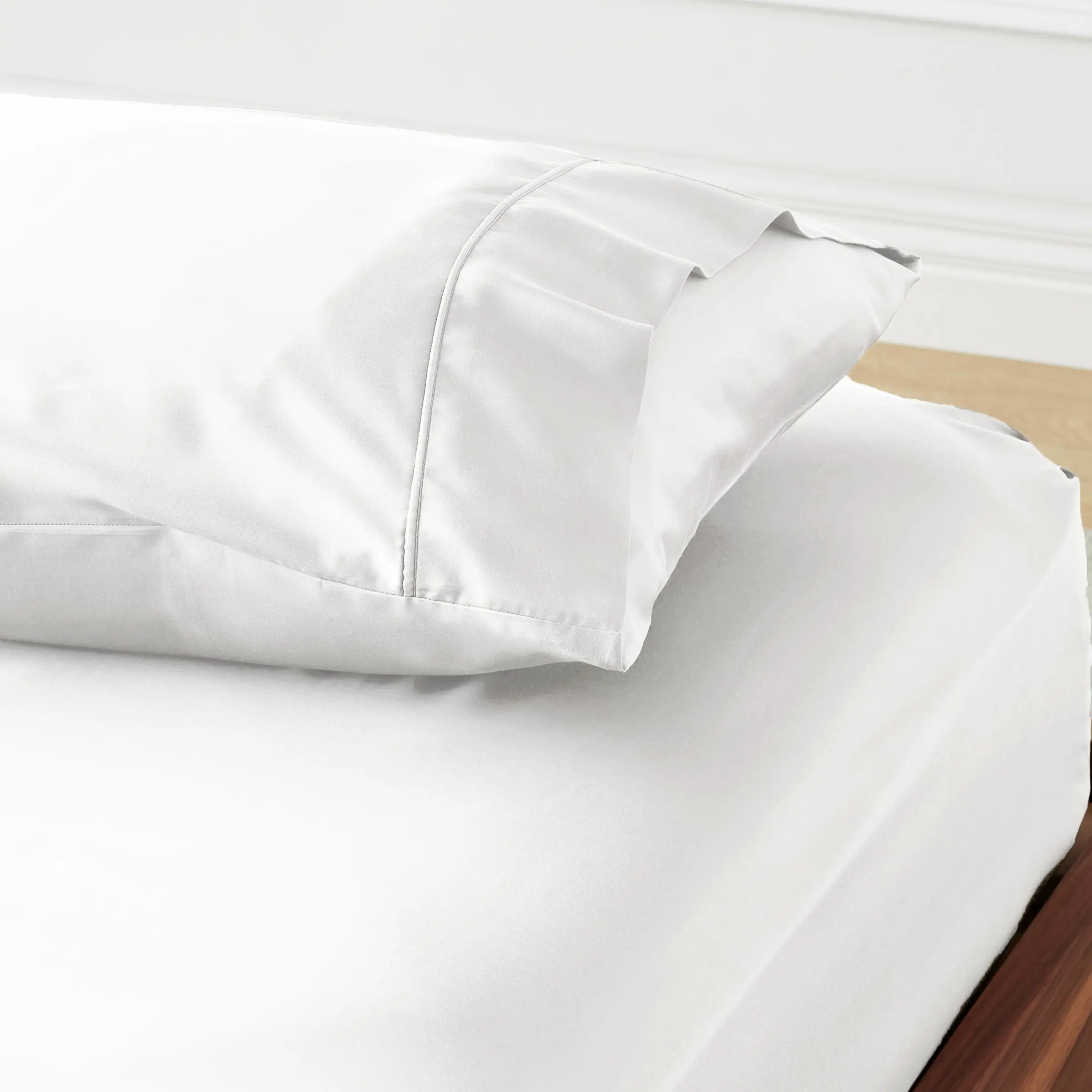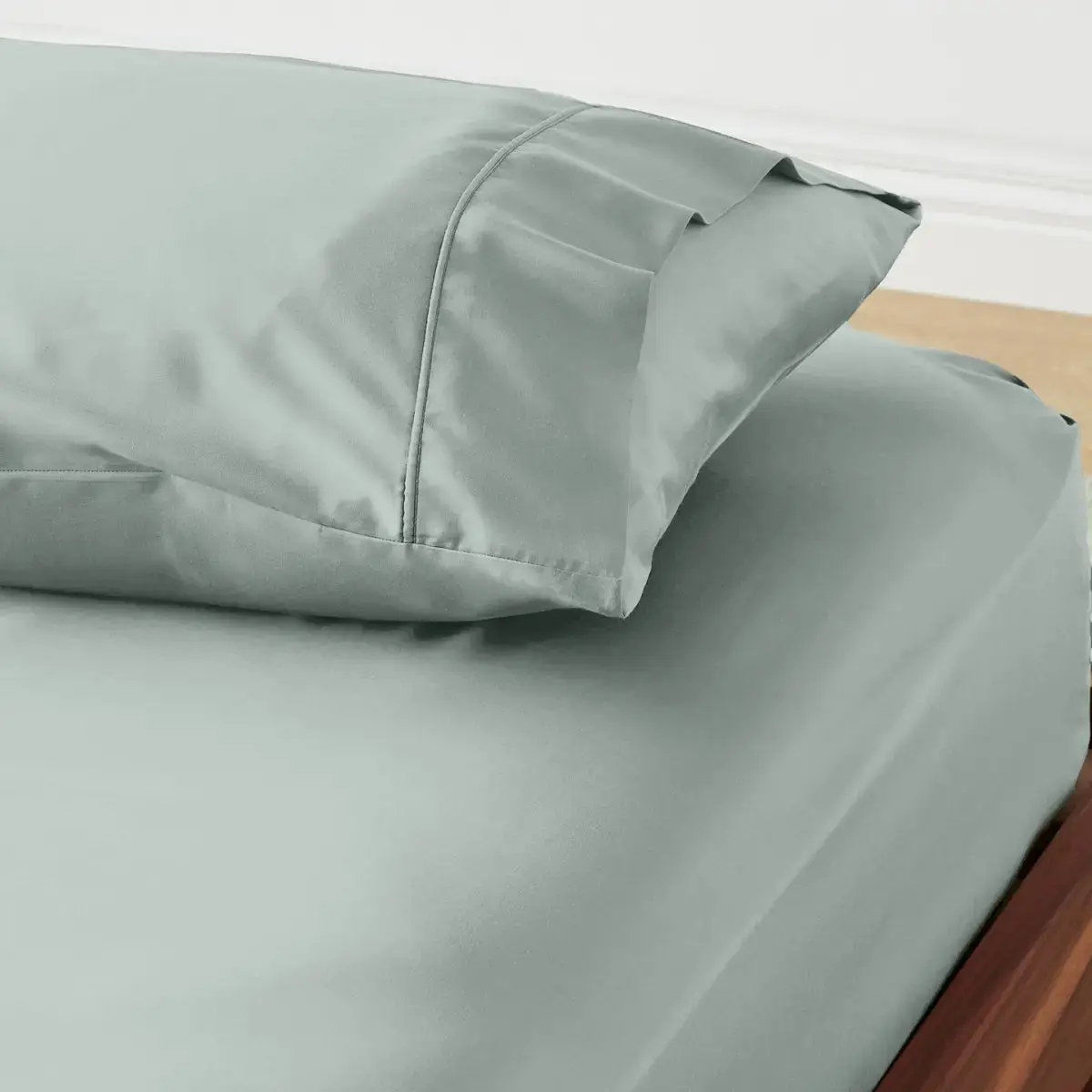How To Wash, Dry & Care For Your Bamboo Sheets
Proper care can extend the life of your bamboo sheets and keep them luxurious. Learn the best practices for washing, drying, ironing, and storing your bamboo bedding.
Why Bamboo Sheets are Worth the Care
Bamboo sheets have surged in popularity in recent years, and for good reason. These sheets are not just soft and comfortable; they also offer numerous health and environmental benefits. They are hypoallergenic, antibacterial, and moisture-wicking, which makes them an excellent choice for people with sensitive skin or allergies. Moreover, they are made from a highly renewable resource, making them a sustainable option for environmentally conscious consumers. Their unique properties set them apart from other bedding options, making them a smart and informed choice for your home.
Despite their many advantages, bamboo sheets do require a bit more care than your average cotton sheets. This is partly due to their delicate nature and the unique properties of bamboo fibers. With the proper care, however, these sheets can last many years and provide countless nights of restful sleep. By understanding and committing to the appropriate care techniques, you can ensure the longevity and quality of your bamboo sheets, making your investment worthwhile.
By following the simple care instructions below, you can extend the life of your bamboo sheets and keep them feeling as soft and comfortable as the day you bought them. This guide will give you all the information you need to care for your bamboo bedding properly, making it easy for you to maintain the quality of your sheets. With the proper care, your bamboo sheets can last for years, providing countless nights of comfort and restful sleep.
Step-by-step Guide to Washing Bamboo Sheets
Washing bamboo sheets is simple but requires some attention to detail. Here is a step-by-step guide on how to do it right.
Step 1: Preparation
Before you start washing, check the care label on your bamboo sheets. This will give you specific cleaning instructions based on the brand and type of bamboo fabric. Next, separate your sheets from other laundry items to avoid potential damage from zippers, buttons, or rough fabrics.
Step 2: Choosing the Right Detergent
Opt for a mild, eco-friendly option when choosing a detergent for washing your bamboo sheets. Harsh detergents can damage the delicate bamboo fibers and remove their natural properties. Be sure to read the labels and avoid products that contain bleach or fabric softeners, as these can weaken the fibers.
Step 3: Washing
Wash your bamboo sheets in cold or lukewarm water on a gentle cycle to prevent shrinking and maintain their vibrant colors. Hot water can cause the fibers to shrink and lose their elasticity. Also, avoid overloading the washing machine, which can cause the sheets to twist and stretch.
Step 4: Rinsing
Rinse your sheets thoroughly to remove all detergent residue. Any leftover detergent can cause the sheets to stiffen and lose their softness. If your washing machine has an extra rinse cycle, use it.
Best Practices for Drying Bamboo Sheets
Drying bamboo sheets properly can prevent shrinkage and wrinkles. Here are some valuable tips to help you do it right.
Tip 1: Air Drying
The best way to dry bamboo sheets is to air dry them. Hang them outside in the shade or indoors, away from direct sunlight. This allows the sheets to dry naturally without the risk of shrinkage or damage from high heat.
Tip 2: Machine Drying
If you must use a dryer, choose the lowest heat setting or the air fluff option. Remove the sheets from the dryer while still slightly damp to prevent wrinkles.
Tip 3: Avoiding Direct Sunlight
While sunlight can naturally disinfect your sheets, direct sunlight can cause bamboo sheets to fade and lose their softness. Always choose a shady spot when air drying to protect your sheets' vibrant colors and soft texture.
Techniques for Ironing Bamboo Sheets
While bamboo sheets are naturally wrinkle-resistant, they may still require occasional ironing. Here are some techniques for ironing bamboo sheets.
Technique 1: Ironing While Damp
Iron your bamboo sheets while they are still slightly damp. This makes it easier to smooth out wrinkles and gives your sheets a crisp, fresh look.
Technique 2: Using the Right Heat Setting
Choose a low heat setting on your iron. High heat can damage the bamboo fibers and cause them to lose their softness and shine.
Technique 3: Using a Pressing Cloth
Place a damp, pressing cloth over your sheets while ironing. This protects the sheets from direct contact with the iron and helps distribute the heat evenly.
How to remove stains
Accidents happen, and stains on your bamboo sheets can be a concern. For best results, address stains as soon as possible. Use a gentle stain remover or a mixture of water and mild detergent. Gently dab the stained area without rubbing, which can spread the stain and damage the fibers.
For tougher stains, soaking the sheets in water and a bit of white vinegar for 30 minutes before washing can help. Always test any stain remover on a small, inconspicuous area first to ensure it doesn't damage the fabric.
How Often Should You Wash Bamboo Sheets?
How often you should wash your bamboo sheets depends on several factors, including personal preference, season, and usage. However, as a general rule, washing your sheets once a week is recommended. This helps keep them fresh, clean, and free from bacteria and allergens. If you sweat heavily or have a skin condition, wash your sheets more frequently.
Storing Your Bamboo Sheets Correctly
Proper storage is essential to keeping your bamboo sheets in excellent condition when not in use. Store them in a cool, dry place away from direct sunlight to prevent fading and weakening of the fibers. Avoid plastic containers, which can trap moisture and lead to mildew.
Instead, use fabric storage bags to allow airflow. This will help keep your bamboo sheets fresh and ready for use. All ettitude bamboo bedding come with a packaging bag made from the same fabric that can be repurposed as your linen storage bag.
Common Mistakes to Avoid
To ensure your bamboo sheets last as long as possible, avoid several common mistakes. First, never use bleach or fabric softeners, as they can degrade the fibers. Second, avoid washing your bamboo sheets with rough fabrics that can cause pilling or damage.
Another major mistake to avoid is using high heat in the dryer or iron, which can lead to shrinkage and weaken the fabric. Lastly, be gentle when removing stains and avoid harsh chemicals that can be too abrasive for bamboo fibers.
How Often Should You Replace Your Bamboo Sheets
The average shelf life will depend on the quality of the sheets and how well the owner has taken care of them. On average, regular bed sheets should be replaced every two to three years. Bamboo sheets are known for their durability, ability to withstand wear and tear, eco-friendliness, and the ability to maintain their softness and look for up to five to ten years if they are well taken care of.
Here are the key signs indicating it's time to replace your bamboo sheets:
- Visible damage: Look for holes, tears, and general wear and tear
- Texture changes: If sheets become rough, scratchy, or uncomfortable
- Persistent odors: When unpleasant smells remain even after washing
- Stains and discoloration: Noticeable discoloration or stubborn stains
- Fit issues: Sheets that have become loose or shrunk
Note: Bamboo pillowcases may need more frequent replacement than sheets due to increased exposure to body oils.
How to Recycle Bamboo Sheets When You're Done With Them
There are several sustainable ways to handle old bamboo sheets:
Resell Program: ettitude re:new program allows you to trade in your preloved ettitude or any other brand’s old sheets to earn $50 in credit for your next ettitude order over $200.
Donate: If your bamboo sheets are still in good shape, consider donating them to charities, shelters, or textile recycling programs that accept gently used bedding.
Repurpose: Give the sheets a second life by turning them into cleaning cloths, reusable bags, pillow covers, or other creative craft projects. This helps reduce waste while extending their usefulness.
Compost: If your sheets are made from 100% bamboo without synthetic blends, they can be composted. Cut them into smaller pieces to speed up decomposition in your compost pile.
Recycling Programs: Some recycling centers accept textiles. Check with your local facility to see if they recycle bamboo fabric or can direct you to a specialized service.
Sleep Better, Longer
Follow proper care techniques to extend the life of your ettitude CleanBamboo® sheets. Try our silky and breathable Signature Sateen Sheet Set or upgrade to our Luxe CleanBamboo® Sateen+ Sheet Set. Our Sateen+ Sheet Sets use bamboo biochar for a naturally antimicrobial, odor-resistant, and antifungal sleep experience. The need for frequent laundering is reduced while maintaining lasting freshness and elegance. Discover our full range of sustainable bedding options here and redefine your sleep experience.
FAQs
Are bamboo bed sheets any good?
Bamboo beddings:
- keep you at the optimal temperature for sleep whether you’re a hot sleeper or a cold sleeper
- are good for those who experience hot flashes, night sweats or hot sleeping due to hormonal changes, pregnancy, menopause and cancer
- ideal for those with sensitive skin, eczema, dermatitis, hives and acne
- are great for allergen sufferers (e.g. dust mites and chemicals)
- help people struggling with insomnia or disrupted sleep (e.g. new parents, unconventional sleeping schedules).
What are bamboo bed sheets?
Bamboo sheets are a type of bedding made from fabrics derived from bamboo. They are known for their softness, breathability, and durability. Bamboo sheets are eco-friendly because the plant from which they are derived grows quickly and doesn't need pesticides, fertilisers, or irrigation.
How to wash bamboo bed sheets?
For washing bamboo sheets, use a cold machine wash on a gentle or delicate cycle with similar fabrics. Line dry or tumble dry on low. Avoid bleach and fabric softener.
How to properly care for bamboo sheets?
Use mild, eco-friendly detergent. You may also use natural, organic detergents like baking soda or white vinegar. Chemical-free soap nuts are a good alternative to traditional detergents, which are pretty harsh on fabrics. Shake out our beddings between washing and drying to lessen wrinkling. Iron at a very low temperature. With proper care, your bamboo bedding should last well over two years of standard use and care.
Why can't you tumble-dry bamboo sheets?
Natural fibers like bamboo are sensitive to heat, which tends to shrink sheets and result in excess wrinkles. One can always choose to dry them on a very low setting to avoid damaging the fabric, but line drying is always best.
How often should you change bamboo sheets?
Like other bedding, dirty bamboo sheets can be replaced with freshly laundered ones every week or two, depending on usage and dirt accumulation.
Bamboo sheets are resilient and adaptable, and given proper care, they should last for years. Replace them when they start to show the usual wear and tear associated with bedding.
How do you keep bamboo sheets from pilling?
Some pilling is natural for organic fibers. To avoid excess pilling, avoid fabric softeners, dryer balls and friction with rough fabrics/surfaces.



























































































